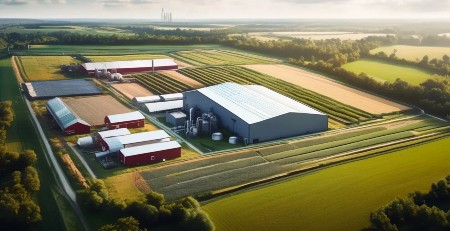We ask you, urgently: don't scroll past this
Dear readers, Catholic Online was de-platformed by Shopify for our pro-life beliefs. They shut down our Catholic Online, Catholic Online School, Prayer Candles, and Catholic Online Learning Resources essential faith tools serving over 1.4 million students and millions of families worldwide. Our founders, now in their 70's, just gave their entire life savings to protect this mission. But fewer than 2% of readers donate. If everyone gave just $5, the cost of a coffee, we could rebuild stronger and keep Catholic education free for all. Stand with us in faith. Thank you.Help Now >
From Plows to Profit: The Rise of Industrialized Agriculture in America
FREE Catholic Classes
The industrialization of agriculture in America began in the early 20th century and was driven by a combination of technological advances, economic forces, and government policies. Prior to industrialization, farming in the U.S. was largely small-scale, labor-intensive, and diversified, with most farmers growing a variety of crops and raising livestock. However, this began to change with the advent of new machinery, synthetic fertilizers, and changes in agricultural policy.

Highlights
10/3/2024 (1 year ago)
Published in Green
Keywords: Agriculture, industrialization
Technological Innovations
One of the key drivers of agricultural industrialization was the introduction of new farming technologies. In the late 19th and early 20th centuries, inventions like the mechanical reaper and steel plow revolutionized crop production, enabling farmers to work larger plots of land with less manual labor. The tractor, which became widely available in the early 20th century, replaced animal power and made it possible for farms to expand significantly. These innovations increased efficiency, allowing fewer farmers to produce more food.
The post-World War II era saw further advancements, including the development of synthetic fertilizers and chemical pesticides. These inputs dramatically boosted crop yields, especially for staple crops like corn and wheat, making farming more productive but also more reliant on external inputs. These technologies helped pave the way for monoculture farming, where vast areas of land were dedicated to a single crop.
Economic Forces
The economic landscape of the 20th century also played a significant role in the industrialization of agriculture. As farms became more mechanized, the cost of farming equipment and inputs rose, requiring farmers to expand operations to achieve economies of scale. Small farms struggled to compete, and many were absorbed into larger operations. The push for higher efficiency led to the consolidation of farmland, with fewer farmers managing larger plots of land.
Large agribusinesses began to dominate the industry, influencing everything from seed production to the distribution of farm products. This consolidation created an agricultural system that was highly specialized and dependent on technological inputs.
Government Policies
Government policies also contributed to the industrialization of agriculture. The Agricultural Adjustment Act of 1933 and subsequent farm bills provided subsidies for certain crops, encouraging large-scale production of commodities like corn, wheat, and soybeans. These policies favored large farms and monocultures, further accelerating the shift toward industrial agriculture.
By the late 20th century, the U.S. had developed an agricultural system characterized by large-scale, specialized production that was heavily reliant on technology, synthetic inputs, and government subsidies. While this system has produced an abundance of food, it has also led to environmental challenges, such as soil degradation, loss of biodiversity, and dependence on chemical inputs.
------------------------------------------------------------------------------------------
Your support makes stories like this possible!
Catholic Online is completely donor supported, allowing us to report on what truly is happening in the world, free of charge and uncensored. A donation to Catholic Online will ensure millions around the world can continue to come to our site to find the faith people are so desperately searching for in life.
Join the Movement
When you sign up below, you don't just join an email list - you're joining an entire movement for Free world class Catholic education.
- Advent / Christmas
- 7 Morning Prayers
- Mysteries of the Rosary
- Litany of the Bl. Virgin Mary
- Popular Saints
- Popular Prayers
- Female Saints
- Saint Feast Days by Month
- Stations of the Cross
- St. Francis of Assisi
- St. Michael the Archangel
- The Apostles' Creed
- Unfailing Prayer to St. Anthony
- Pray the Rosary
![]()
Copyright 2025 Catholic Online. All materials contained on this site, whether written, audible or visual are the exclusive property of Catholic Online and are protected under U.S. and International copyright laws, © Copyright 2025 Catholic Online. Any unauthorized use, without prior written consent of Catholic Online is strictly forbidden and prohibited.
Catholic Online is a Project of Your Catholic Voice Foundation, a Not-for-Profit Corporation. Your Catholic Voice Foundation has been granted a recognition of tax exemption under Section 501(c)(3) of the Internal Revenue Code. Federal Tax Identification Number: 81-0596847. Your gift is tax-deductible as allowed by law.








